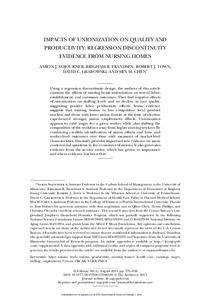Impacts of unionization on quality and productivity. Regression discontinuity evidence from nursing homes

Sojourner, Aaron ; Frandsen, Brigham R. ; Town, Robert J. ; Grabowski, David C. ; Chen, Min M.
2015
68
4
August
771-806
medical care ; nurse ; productivity ; trade unionization ; trade union
Trade unionism
http://dx.doi.org/10.1177/0019793915586380
English
Bibliogr.
"Using a regression discontinuity design, the authors of this article examine the effects of nursing home unionization on several labor, establishment, and consumer outcomes. They find negative effects of unionization on staffing levels and no decline in care quality, suggesting positive labor productivity effects. Some evidence suggests that nursing homes in less competitive local product markets and those with lower union density at the time of election experienced stronger union employment effects. Unionization appears to raise wages for a given worker while also shifting the composition of the workforce away from higher-earning workers. By combining credible identification of union effects and firm- and worker-level outcomes over time with measures of market-level characteristics, this study provides important new evidence on many controversial questions in the economics of unions. It also generates evidence from the service sector, which has grown in importance and where evidence has been thin."
Digital
The ETUI is co-funded by the European Union. Views and opinions expressed are however those of the author(s) only and do not necessarily reflect those of the European Union or the ETUI.